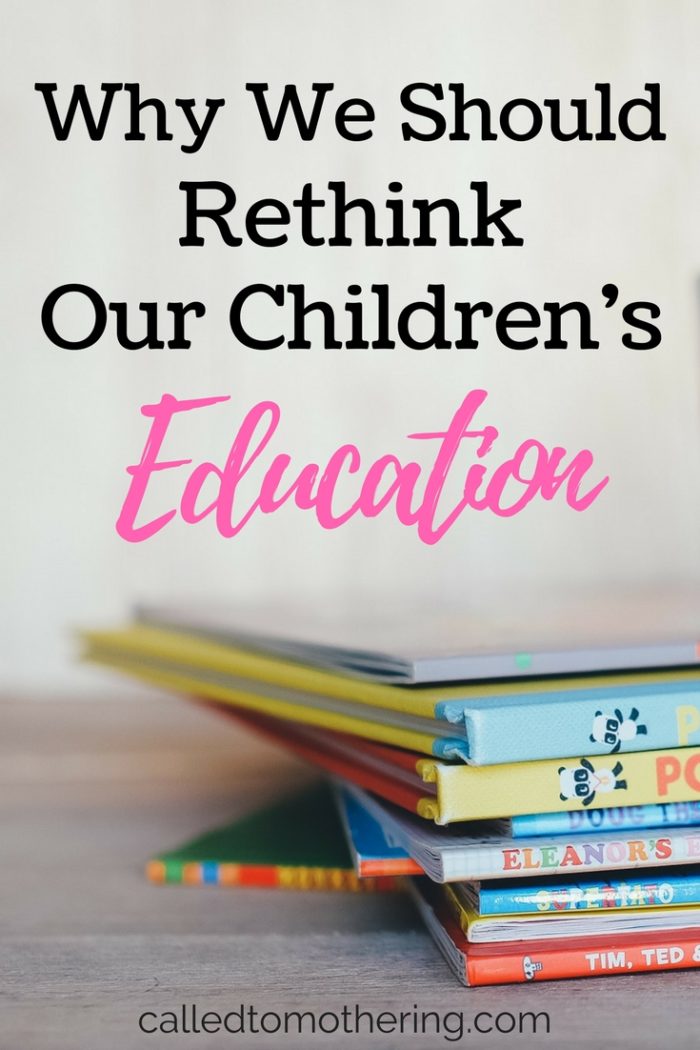A mother from my church recently asked me about the pros and cons of homeschooling. Her son will be entering Pre-K in a few months, and while he is still over a year away from starting Kindergarten, she is starting to consider schooling options seriously.
Moms usually take factors like high test scores, lots of extracurricular activities and nice, caring teachers into consideration when making this important decision and call it good. But think about it.
We all go to great lengths to make certain that our child’s pediatrician’s practices correlate with our values. We interview several preschool instructors to ensure their philosophy of learning matches up with our desires. We even read food and soap labels, on the hunt for “parabens”, “thiamin mononitrate”, “rBST”, and “Red Dye #40” because we know the importance of putting the right products into their bodies.
The world can be a scary place, so we are wise to know the kind of kids and adults they are hanging around with, the types of shows they are watching, and if the food they’re eating contains chemicals or growth hormones.
But how many of us sit down with their teachers at the beginning of the school year, quizzing them on their teaching methods and examining their lesson plans? Most of us just assume that the person hired to instruct our kids has the qualifications necessary because the district checked their credentials.
Have we really considered where they will spend the next twelve years soaking up information, five days a week, 180 days a year?
The Problem With Our Definition of Success
As Christians, we need to be more concerned about training our children’s hearts instead of their minds. Academics should take a back seat to character training and discipline, but all too often it is the primary focus.
Our definition of a good education is usually one that prepares a student to get into a great college and land a successful job so they can live a life of peace and affluence.
But an education is not the sum total of a child’s academic performance in five different subject areas. Tests can’t measure problem solving skills, passion, creativity, integrity, ideas, compassion, insight, or empathy.
We need to apply biblical wisdom to our educational choices. Instead of asking how a school performs on standardized tests or whether it has a good sports or music program, we should be asking questions like:
- What will our children’s school do to invest in the development their faith, character, and morals?
- What kinds of values are behind their curricula and programs?
It is crucial to make sure that the people to whom you grant your children’s education and training are enhancing, rather than undermining, the values you’re teaching at home.
Misunderstanding Education’s True Objective
People often make the mistake of assuming that since a particular education method is secular, or non-religious, it must be morally neutral. Moral instruction has nothing to do with math and science, they say.
However, it would be quite difficult to run a school without having at least some moral and behavioral demands. You’d be hard pressed to find a public school in America that doesn’t have a zero tolerance policy for bullying.
And if they separate education and morality, as they claim, why teach sex in the classroom? Aren’t these moral subjects that should be left up to parents to decide how and when they should be taught?
That’s because, as they are fully aware, the objective of any education is not just to impart knowledge. It involves the shaping of character and transmitting of values.
The nature of education is that it must encompass a worldview (set of beliefs about God, man, knowledge, ethics, and truth). This worldview shapes educational theories and methods, which then drive curriculum.
So it is not a question of whether morals will be taught in your child’s school, but rather which morals will be taught. If God’s wisdom is absent, then man’s wisdom just takes its place. There is no middle ground.
Without godly wisdom as the foundation for a school’s knowledge, what does that institution base their moral imperatives on? You can tell a kid to be respectful toward his classmates, but it helps if you give him a reason why. And therein lies the problem with a secular education- it is foundationless.

Surprised When Input Results In Outcome
The story of a Hindu mother who began sending her daughter to a small Christian school appeared in the Sept.-Oct. 2014 issue of Home School Enrichment. This mother was initially perplexed by her daughter’s repeated references to the Bible, wondering how a one-hour Bible class per day could spark such an interest.
When her daughter’s teacher informed her that she tried to teach about the Bible all day long- not just during the regular Bible class- the light went on, and the mother went from perplexed to distressed. “How can I compete with that?” she exclaimed.
If it strikes us as odd that a Hindu parent would choose a Christian school and then be surprised when her child shows an interest in Christianity, why is it that so many Christian parents send their children to a secular school and then are surprised when their children actually become secular?
Yes, kids are all born sinners no matter which school they attend. And they will all make mistakes. But even grown adults understand that whatever you take in through your eyes, ears, and heart is what you will ultimately meditate on.
There’s a difference between exposing our kids to secular views and fully immersing them in a secular, immoral, anti-Christian environment. Considering that one of the greatest blessings of children is that they are “like arrows in the hand of a warrior” (Psalm 127:4), it would be unwise to allocate so much of their time to a place that trains its students in the enemy’s worldview.
When the input of children’s minds is 10,000 hours worth of humanistic teaching, we can’t be shocked by the outcome.
The sheer amount of time spent at school compared to the time spent at home and church practically guarantees that kids will walk away with a completely secular training and become of the world, despite all of our efforts to train them up in God’s Word.
Choosing where to have your children educated is a big decision, and we must examine our priorities. Do we care more about our child reading fluently by age six, or being biblically literate?
Do we shake our fists at schools for cutting music and the arts, but barely shrug our shoulders when they leave God out?
If our goal is to raise children who have a biblical understanding and are shaped more by God’s Word than the philosophies of the world, we should choose a process of education consistent with that goal!



I love this post! I agree completely with our need as parents to strongly consider the influences our children get at school. This was my son’s first year in kinder and we were blessed with a Christian teacher and “coach” plays Christian music during PE although this is a public school. Pleasantly surprising. We’ve considered a private church school for next year (so expensive) but we feel it is worth it and we’ll have a good idea going forward what works best. I’ve considered home schooling because of vaccines but that’s a whole other issue and post itself. Thanks for your input. Without the foundation on Biblical principles all other ground is sinking sand. Amen.
Right on! I home educated my children and you are on point. We place way too much stock in worldly “success” and not enough in what God tells us about success. Our priorities are mixed up.
I live in a part of the country where a huge chunk of public school teachers are Christians.
Even with that fact, they can’t say everything they’d like to and can’t completely control the influence of the students and other teachers.
Your point about not interviewing teachers is spot on. I was a public school educator for 10 years and was always amazed by the amount of trust parents gave me.
Thanks for this post!
Yes! I am so with you. I would love more and more Christian parents to be active thinkers about what education truly is and the impact schooling has on, not only their children, but the family unit as a whole. Love your blog!
I love this post…thank you for writing lots of things that I am thinking!! My eldest is 5 and we homeschool. Not many people around us do, so we’re always having to defend our decision. It’s refreshing to read this perspective put so clearly.
YYYEEESSSS. ‘Nuff said. 🙂